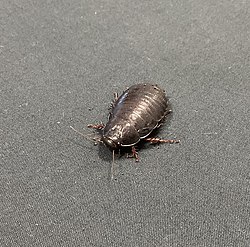Biology:Panesthia lata
| Panesthia lata | |
|---|---|

| |
| Female Lord Howe Island cockroach (Panesthia lata) from Blackburn Island | |
| Scientific classification | |
| Kingdom: | |
| Phylum: | |
| Class: | |
| Order: | |
| Family: | |
| Subfamily: | |
| Genus: | |
| Species: | P. lata
|
| Binomial name | |
| Panesthia lata Walker, 1868
| |
Panesthia lata, the Lord Howe Island wood-feeding cockroach or Lord Howe Island cockroach, is a large, wingless cockroach species endemic to the Lord Howe Island Group in the Tasman Sea.[1][2]
Appearance and diet
Panesthia lata is reasonably large, growing between 22–40 millimetres (0.87–1.57 in).[3][4][5] It is metallic in colour, with general black to reddish colouration.[3][4] It can be distinguished from other related species by its shape and the markings on its thorax.[6]
The species feeds on rotting wood and leaf litter, and has micro-organisms in its digestive system to help break down cellulose.[3][5] It stays in the ground during the day and feeds at night.[5]
Population
While once widespread across the archipelago, it was removed from Lord Howe Island proper by rats introduced in 1918, and none have been found for over 60 years.[1][3][4] Today, the only known populations occur on nearby islets, including Blackburn Island, Roach Island and Ball's Pyramid.[1][5] The species is classified as "Endangered" under the New South Wales Threatened Species Act, and a plan exists to eventually reintroduce a population to Lord Howe Island.[7]
Taxonomy
Panesthia lata was first described in 1868 by Francis Walker in his "Catalogue of the specimens of Blattariæ in the collection of the British Museum".[4][8][6] It is in the subfamily Panestheiinae, which is distributed across Southeastern Asia and Oceania.
Rediscovery on Lord Howe island
After not having been observed on Lord Howe Island for over 80 years, a biology student at the University of Sydney rediscovered them on the island in late 2022.[3][5]
References
- ↑ 1.0 1.1 1.2 Carlile, Nicholas; Priddel, David; O'Dwyer, Terence (2017-07-11). "Preliminary surveys of the endangered Lord Howe Island cockroachPanesthia lata(Blattodea: Blaberidae) on two islands within the Lord Howe Group, Australia". Austral Entomology 57 (2): 207–213. doi:10.1111/aen.12281. ISSN 2052-174X. http://dx.doi.org/10.1111/aen.12281.
- ↑ Australia, Atlas of Living. "Species: Panesthia lata (Lord Howe Island Wood-Feeding Cockroach)" (in en-AU). https://bie.ala.org.au/species/https://biodiversity.org.au/afd/taxa/7714ade9-2a0f-439e-a76e-4769776211e9.
- ↑ 3.0 3.1 3.2 3.3 3.4 "Extinct wood eating cockroach rediscovered after 80 years" (in en-AU). https://www.sydney.edu.au/news-opinion/news/2022/10/01/extinct-wood-eating-cockroach-rediscovered-after-80-years.html.
- ↑ 4.0 4.1 4.2 4.3 "Lord Howe Island wood-feeding cockroach (Panesthia lata) - endangered species listing" (in en). http://www.environment.nsw.gov.au/topics/animals-and-plants/threatened-species/nsw-threatened-species-scientific-committee/determinations/final-determinations/2004-2007/lord-howe-island-wood-feeding-cockroach-panesthia-lata-endangered-species-listing.
- ↑ 5.0 5.1 5.2 5.3 5.4 Conversation, The (2022-10-07). "A Large, 'Extinct' Australian Cockroach Has Reappeared After More Than 80 Years" (in en-US). https://www.sciencealert.com/a-large-extinct-australian-cockroach-has-reappeared-after-more-than-80-years.
- ↑ 6.0 6.1 British Museum (Natural History).; History), British Museum (Natural; Gray, John Edward; Walker, Francis (1868). Catalogue of the specimens of Blattariæ in the collection of the British Museum. London: Printed for the Trustees of the British Museum. https://www.biodiversitylibrary.org/item/35169.Description on p. 24
- ↑ "Lord Howe Island wood-feeding cockroach (Panesthia lata) | Conservation project | NSW Environment, Energy and Science". https://www.environment.nsw.gov.au/savingourspeciesapp/project.aspx?ProfileID=10887.
- ↑ "species Panesthia lata Walker, 1868: Cockroach Species File". http://cockroach.speciesfile.org/Common/basic/Taxa.aspx?TaxonNameID=1173701.
Wikidata ☰ Q10615950 entry
 |

